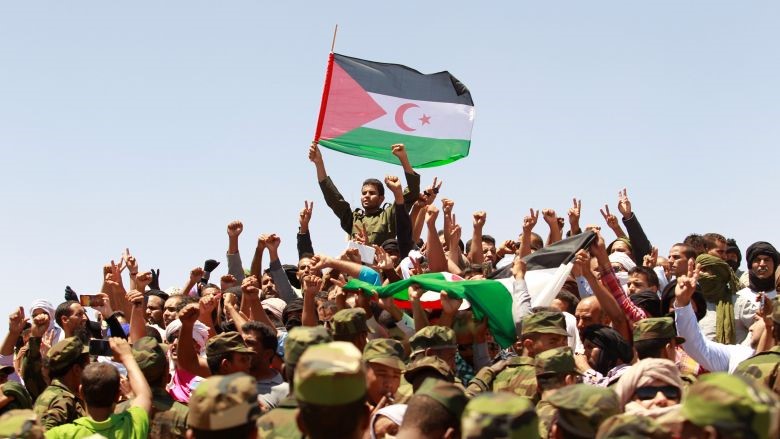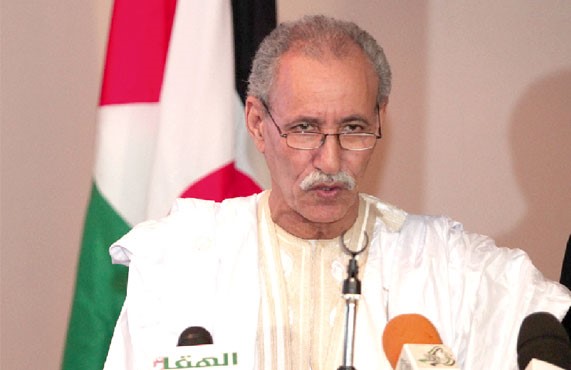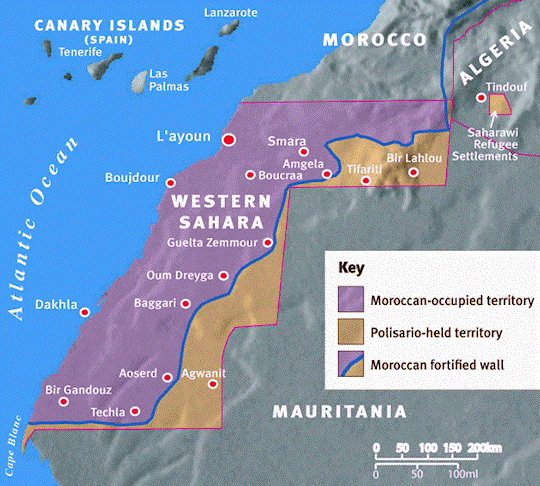Andrew McGregor
June 24, 2016
The death from illness on May 31 of the Polisario Front’s long-time leader Mohamed Abdelaziz has brought the exiled Sahrawi independence movement of the Western Sahara to an ideological crossroads. The Polisario nation, known as the Sahrawi Arab Democratic Republic (SADR), is effectively a state without land, save for a small strip of desert optimistically known as “the Free Zone.” Nonetheless, the SADR is recognized by 46 nations and is a full member of the African Union.
The Sahrawi community is led by its sole political expression, the secular, left-wing Polisario Front (Frente Popular para la Liberación de Saguia el-Hamra y Río de Oro – Popular Front for the Liberation of Saguia al-Hamra and Rio de Oro), founded in 1973 to combat Spanish colonialism. Ninety-one years of Spanish colonialism in the Western Sahara was replaced in 1975 with a 16-year war against Morocco and Mauritania, who sought to split the former colony between them. Spain effectively abandoned its West Saharan territories, leaving the region of Saguia al-Hamra (The Red Canal) to Morocco and Rio de Oro (The Gold Coast) to Mauritania. The latter eventually withdrew from Rio de Oro, but Morocco quickly occupied the area. Under the terms of a 1991 ceasefire, a UN mission was to register Sahrawis for a referendum on independence or acceptance of a Moroccan offer of autonomy under Moroccan sovereignty. This process has yet to start; in the meantime, Morocco has developed the region’s fisheries and phosphates industry and is now in the early phases of oil and gas exploration, much to the dissatisfaction of the exiled Sahrawi community.
While the Polisario leadership will use a 40-day mourning period to decide whether a leadership change should reflect the desirability of new directions for the movement or the persistence of the status quo, Morocco, which lays claim to Western Sahara, will simultaneously be seeking new openings to break the lingering impasse. During this crucial period, the Sahrawi exile community, most of whom live in a complex of six refugee camps surrounding the southwest Algerian town of Tindouf and are reliant on international donations of food and other aid, must deal not only with leadership succession, but also with:
- Morocco’s expulsion of the UN mission charged with organizing an independence referendum;
- The attraction of the Islamic State and other extremist factions to alienated Sahrawi youth; and
- The political implications of offshore oil exploration contracts negotiated by Morocco without Polisario involvement.
Morocco insists it is merely reclaiming territory (its so-called “Southern States”) that had been occupied by the Spanish up until 1975. Polisario regards the Moroccan presence as colonialism, “an international crime against the Saharawi people, as well as a continuing threat to peace and regional security” (Ennahar [Algiers], June 15).
The dispute has been absorbed into the wider rivalry between Morocco and its Maghreb neighbor, Algeria, contributing to its intractability.
The Leadership Question
Mohamed Abdelaziz was elected as Polisario Front secretary-general and president of the SADR in August 1976, ruling with the help of a small but powerful group of loyalists. At the time of his death, he was serving his 12th consecutive term as president. The interim leader is one of Abdelaziz’s closest associates, Khatri Adouh, the president of the Sahrawi National Council (the SADR’s governing body).
Among the candidates for the SADR presidency are Brahim Ghali, who will likely have Algeria’s approval; Mohamed Lamine Bouhali, the current defense minister and a former Algerian army officer; Prime Minister Abdelkader Taleb Omar; Reconstruction Minister Mohamed Salem Ould Salek; and Bashir Mustapha Sayed, the brother of Polisario Front founder El-Ouali Mustapha Sayed (North Africa Post, June 1).
Polisario has always been as much a social movement as a political one. It has a strong focus on eliminating tribalism through the eradication of tribal identities and the pursuit of Arab nationalism and (at least initially) Marxist-style collectivism and anti-colonial ideology derived from political theorist Franz Fanon and various African liberation leaders of the 1960s. Its claim to a collective purpose expressing the common will of all Sahrawis and its pervasiveness in Sahrawi refugee life precludes for the Polisario leadership any possibility of internal opposition to the movement. Since the SADR’s existence depends on external aid and all such aid is funneled through Polisario-friendly Algeria, the leadership has the means of enforcing this opinion.
 Scene from the Funeral of Mohamed Abdelaziz (Ramzi Boudina/Reuters)
Scene from the Funeral of Mohamed Abdelaziz (Ramzi Boudina/Reuters)
Polisario anti-colonialism, however, carries within it a fatal contradiction – the SADR is based on the amalgamation of several territories defined by colonially-imposed boundaries. Rejection of these boundaries as the basis of the SADR would tend to validate the Moroccan position that no state existed in the region prior to Spanish occupation aside from a handful of local tribal chiefs, many of whom at one time or another had pledged allegiance to the Moroccan Sultan or established economic relations with the Kingdom.
In the absence of a political system that accommodates opposition viewpoints, dissenting Sahrawis tend to vote with their feet, defecting into Moroccan-governed territory to reunite their divided families. Morocco claims over 10,000 Sahrawis have done this so far, but the process is strongly discouraged by the Polisario, which recognizes that the only thing keeping the SADR from becoming a purely virtual state is its ability to claim the loyalty of a significant portion of the Sahrawi population. Protests continue in the Moroccan-administered area against rule from Rabat, often resulting in excesses by the Moroccan police.
Failure of MINURSO
Formed in 1991, the UN mission in the Western Sahara, known as MINURSO (Misión de las Naciones Unidas para la Organización de un Referéndum en el Sáhara Occidental – United Nations Mission for Referendum in Western Sahara) continues to fulfill its mandate to monitor the 1991 ceasefire, but it has yet to begin its task of registering voters and preparing a referendum on the Western Sahara’s future. Many officers of this expensive peacekeeping mission have instead passed the time by vandalizing the region’s prehistoric rock art with spray-painted graffiti (The Times, February 7, 2008). Furthermore, thanks to French opposition in the UN Security Council, MINURSO remains the only UN mission without a human rights component, tying its hands when confronted with human rights abuses.
Both the Polisario and Morocco oppose MINURSO efforts at voter registration, given disputes over the eligibility of the large number of Moroccans who have settled in Moroccan-ruled Western Sahara since 1975 and the number of Malians, Mauritanians and Algerians who have joined the SADR camps. A census in the Tindouf camps might also reveal a smaller number of refugees than are currently claimed by authorities, putting at risk the ability of Algerian and Polisario authorities to siphon off an over-supply of humanitarian aid that eventually appears in regional markets. In the event MINURSO is kept from fulfilling its mission, UN Secretary General Ban Ki-moon has warned of “escalation into full-scale war” and the presentation of new opportunities for “terrorist and radical elements” to exploit the situation (al-Jazeera, April 19).
The UN secretary-general enraged Moroccan authorities when he referred to Moroccan “occupation” of the Western Sahara during a March 5 visit to the Sahrawi refugee camps around Tindouf (al-Jazeera, March 29). Following accusations that the UN had abandoned its neutral stance on the issue, Morocco expelled U.S. aid staff from the region, ordered the UN to withdraw civilian personnel, and closed a MINURSO military liaison office despite profuse apologies from the secretary-general’s office.
Ban’s call for negotiations without precondition between the SADR and Morocco seems bound for the same UN black hole in which most calls tend to disappear. No matter what UN officials might say, such negotiations would be widely regarded both internally and externally as Moroccan recognition of the SADR’s existence. Morocco is instead playing out a long-term strategy to create a set of facts on the ground that would make a separate Western Saharan state inconceivable. Most important of these is a 1,250-mile-long sand berm separating the economically useful section of Western Sahara from the lightly populated “Free Zone.” Equipped with radar, motion detectors, rapid response teams, air support, and some of the world’s largest minefields, this sand wall has proved an effective counter to Polisario’s military qualities of mobility and intimate knowledge of local terrain.
Attraction of Islamic State and Other Extremist Groups
More than 50 percent of the population of the Polisario refugee camp is under 18 and few have ever set foot in their “homeland.” Limited employment opportunities mean many young Sahrawis are joining the 6,000 to 7,000 strong Ejercito de Liberación Popular Saharaui (ELPS or Sahrawi People’s Liberation Army), the military wing of the Polisario Front. Deeply unhappy with the lack of diplomatic progress in resolving the independence issue, many young Sahrawis are calling for a return to the battlefield.
Though internal pressure could drive the Sahrawis back to war, the outcome of any conflict with the larger, better armed and better trained Royal Moroccan Army is predictable. With Algeria unlikely to support renewed conflict in any substantial way, there is a danger veteran jihadis might be able to offer valuable battlefield support against a Moroccan regime, while introducing Salafi-jihadist ideology to the struggle. Similar situations have been seen in the past; in the Chechen anti-Russian resistance, jihadism developed at the expense of secular nationalism as a result of an influx of much-needed, but religiously motivated, foreign fighters.
Alternatively, a quick or even extended collapse of Sahrawi military resistance in renewed combat could lead to a loss of faith in the nationalist cause on the part of young fighters and an increase in smuggling, an important source of income for young Sahrawis that inevitably puts them in contact with traffickers from extremist groups. Integration with extremist networks such as al-Qaeda in the Islamic Maghreb (AQIM) often follows, whether as paid employees or ideologically committed jihadists.
The 2010 Algerian arrest of a Polisario imam discovered with arms, 20 kilograms of explosives, and correspondence with AQIM leader Abd al-Malik Droukdel (a.k.a. Abu Musab Abd al-Wadud) and the kidnapping the next year of three European aid-workers from a Tindouf camp by a Movement for Unity and Justice in West Africa (MUJWA) cell that included Sahrawis were strong indications that extremism has penetrated the Polisario camps. [1]
By July 2012, Sahrawi Defense Minister Bouhali admitted that there were 20 to 25 Sahrawis involved in Islamist militancy, divided between AQIM and MUJWA (ABC.es [Madrid], August 11, 2012). The statement was a break from Polisario’s usual insistence that AQIM holds no attraction to Sahrawis. In March 2013, Mali’s foreign minister insisted that Polisario “mercenaries” had been recruited by the radical MUJWA for monthly salaries running between 200 to 600 Euros (Le Mag [Marrakesh], March 16, 2013).
The best known of the Sahrawis who have committed to religious extremism is Abu Walid al-Sahrawi – a former member of the ELPS, MUJWA, and Mokhtar Belmokhtar’s al-Murabitun organization – who joined Islamic State in 2015 and now calls for Moroccans and Sahrawis to support the Islamic Caliphate in the Maghreb. In May, Abu Walid threatened to launch attacks on MINURSO personnel, tourists and foreign assets in the Sahara (al-Jazeera, May 4; North Africa Post, May 6; al-Akhbar [Nouakchott], May 13, 2015). Like many Sahrawis, Abu Walid was educated in Algeria and Cuba. Algerian universities often expose young Sahrawis to more militant strains of Islam than those that usually prevail in the camps.
Offshore Oil Exploration
When Morocco began awarding contracts for oil exploration in the Western Sahara in 2002, the UN called for a legal opinion to define the legality of such measures in the absence of recognition of Moroccan sovereignty over the area. Known as the Corell Opinion, the statement remains the guiding principle for Moroccan-negotiated foreign investment in the region, but the opinion has been subject to much interpretation and has been used to both justify and condemn Moroccan development undertaken without consultation with the Sahrawi people. [2]
Mustapha al-Khalfi, Morocco’s minister of communications, insists that investment and the region’s natural resource management are driven by the needs of the population. He also maintains that the participation in investment decisions of democratically elected representatives of the Sahrawi community means that “the exploitation of the natural resources in the Sahara takes place within the framework of international law with the involvement of the population and for its benefit” (al-Jazeera, July 10, 2015).
The current controversy over resource extraction is fueled by the Moroccan-authorized offshore exploration activities of Texas-based Kosmos Energy in the Cap Boujdour area, approximately 70km off the shore of Western Sahara and part of the larger Aaiun Basin. Kosmos defends its activities by noting that, at this point, they are “focused solely on exploration and do not involve the removal of resources… We believe, however, that if exploration is successful, responsible resource development in Western Sahara has the potential to create significant long-term social and economic benefits for the people of the territory.” [3]
The absence of substantial international opposition to the operations of foreign resource extraction firms in the contested region constitutes an important step in the explicit or de facto recognition of Moroccan claims in the Western Sahara.
Conclusion: The “Sahrawi State”
With the slow-moving machinations of international diplomacy and commerce working against them, Polisario’s chances of forming a legitimate state diminish with each passing year. The “Sahrawi State” is in the uncomfortable position of existing solely at the sufferance of Algiers. While an Algerian-Moroccan rapprochement seems unlikely in the short term, any future mending of their relationship would make Polisario and all its trappings of a “virtual” state entirely expendable. The future of the republic lies with its restless youth rather than Polisario’s aging first generation. Without jobs or meaningful futures, many desire a return to conflict. However, such a war, like all else, cannot happen without Algerian approval, and this might prove difficult if not impossible to obtain.
Polisario allows Algiers to affect a certain moral superiority over Morocco on the international stage, but a Polisario return to war would immediately be regarded as Algerian-sponsored and would be of little advantage to either party. A more likely scenario is a growing attraction to religious militancy as the foundation of a new state potentially free from both Moroccan and Algerian domination, especially if the option is the perpetuation of a stifling status quo in the isolated camps of Tindouf.
This attraction may co-exist with a greater willingness on the part of other Sahrawis to accept Morocco’s offers of regional autonomy under Moroccan sovereignty, combining to eventually shatter the Polisario’s independence ambitions.
NOTES
- “The Algerian Foreign Policy on Western Sahara,” in Anouar Boukhars and Jacques Roussellier (eds.), Perspectives on Western Sahara: Myths, Nationalisms and Geopolitics, Lanham, 2014, p.115, fn.32
- Hans Corell, “Letter dated 29 January 2002 from the Under-Secretary-General for Legal Affairs, the Legal Counsel, addressed to the President of the Security Council, United Nations Security Council,” February 12, 2002, http://www.arso.org/UNlegaladv.htm
- See position statement: Kosmos Energy: On Hydrocarbon Exploration Offshore Western Sahara, February 2014, www.kosmosenergy.com/pdfs/PositionStatement-WesternSahara-English.pdf
This article first appeared in the June 24, 2016 issue of the Jamestown Foundation’s Terrorism Monitor
AIS Update, July 13, 2016: Unsurprisingly, a Congress of the Polisario Front chose the candidate with the closest ties to Algeria as the new president of the Sahrawi Arab Democratic Republic and the secretary-general of the Polisario Front on July 9. Brahim Ghali, the new president, promptly announced his first official visit would be to Algiers.
 New President of the SADR, Brahim Ghali
New President of the SADR, Brahim Ghali
Born in 1949, the former ambassador to Algeria was a founding member of the Polisario Front. He began a military career in a Spanish unit of Sahrawi volunteers in the 1960s. By 1969 he was deeply involved in anti-colonial activism and was jailed several times. Shortly after he participated in the founding of Polisario in 1973, he was one of the leaders of the Front’s first raid on a Spanish Army post, a successful affair that helped arm the independence movement.

